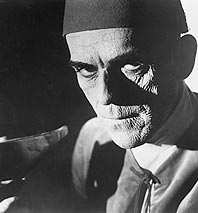
The greatest of all horror stars was a study in darkness and light. Boris Karloff could be the most fiendish bogeyman imaginable but also the grandfather reading you the story of that bogeyman in the safety of your bedroom. In maybe his scariest performance, in The Body Snatcher, he is a murderous grave robber who, in one scene, speaks to a small boy in tones so mellifluous they’d induce any Hansel and Gretel into an oven.
Both sides of Karloff can be seen in the fourteen-movie Film Forum retrospective (from February 3 to 9), on the occasion of the 75th anniversary of the film that made Karloff a legend, James Whale’s Frankenstein. Feral, brutish, yet heartbreaking in his incomprehension, Karloff’s monster remains powerful enough to dispel all memories of Halloween masks and cereal boxes and Young Frankenstein.
Born William Henry Pratt to a family of English civil servants (who never made peace with his career), he was a gentle, private man who worked incessantly—and whose sinister melancholy comes through most vividly as the lovelorn, onion-skinned Im-ho-tep in The Mummy. The retrospective includes two early rarities, Graft and The Guilty Generation, as well as Karloff’s gleefully macabre Fu Manchu in the floridly racist The Mask of Fu Manchu. Only in John Ford’s The Lost Patrol do you catch him madly overacting as a religious zealot, although this bleak portrait of British soldiers picked off one by one in the desert is remarkably prescient and ripe for rediscovery. The series is capped by Peter Bogdanovich’s brilliant debut, Targets, in which the elderly Karloff plays more or less himself on a collision course with a sniper who picks off people at random. It’s a meditation on old versus new horror—on the end of an orderly world of gods and monsters. Karloff sheds his bogeyman persona, but he’s no longer able to comfort us in our beds.
